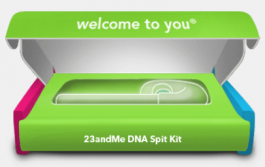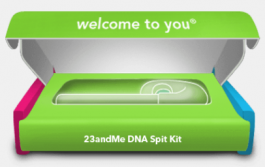 By now everyone has heard of the very pointed and frustration-toned warning letter that 23andMe received from the F.D.A., which ordered the company to immediately stop selling and marketing their consumer genetic testing service. The question is: Now what?
By now everyone has heard of the very pointed and frustration-toned warning letter that 23andMe received from the F.D.A., which ordered the company to immediately stop selling and marketing their consumer genetic testing service. The question is: Now what?
 By now everyone has heard of the very pointed and frustration-toned warning letter that 23andMe received from the F.D.A., which ordered the company to immediately stop selling and marketing their consumer genetic testing service. The question is: Now what?
By now everyone has heard of the very pointed and frustration-toned warning letter that 23andMe received from the F.D.A., which ordered the company to immediately stop selling and marketing their consumer genetic testing service. The question is: Now what?
I first got a kit for this “health and ancestry” service back in 2011. I recall the easy part, spitting into this special plastic tube, opening an online account, and then sending the tube to their lab via mail in a special box. I also recall my great trepidation when a few weeks later I got an email letting me know my results were in and I was invited to see them online. On the one hand, I was very curious to see the reports. It was like opening a fortune cookie at the Chinese restaurant, curious but knowing that I could ignore or rationalize whatever fortune I got because it would be so generic and, we were told, was based on very early preliminary, extrapolated research. Another part of me was much more apprehensive because this actual, personalized testing of my own DNA could tell me something I didn’t already know, but do so in a somewhat factual way – or at least as factual as statistical probability analysis can get.
My memory of the exercise back then, as well as after getting notices of the follow-up surveys and new analyses based on new independent research, is one of unease. But I always took them with a sense of curious disregard, not knowing what exactly to make of it all. Should I be happy that my genetic-based risk for a cardiovascular event is low, even though my untreated LDL-cholesterol level and weight are both on the high side? Should I worry and run to the doctor knowing I have a slightly elevated risk for Restless Leg Syndrome in my lifetime, even though I don’t know of any immediate family members who suffers or suffered of it, that I know of – not to mention that no one had heard of this syndrome 10 years ago?
With all this hesitation and pondering of my own, I completely understand the concerns of the F.D.A. There seems to be an implicit, and I think explicit, promise in the marketing of their service. Even today, two weeks after being ordered to stop marketing the test, the landing page of 23andMe website still shouts:
- “Carrier status: Find out if your children are at risk for inherited conditions, so you can plan for the health of your family.
- Health risks: Understand your genetic health risks. Change what you can, manage what you can’t.
- Drug response: Arm your doctor with information on how you might respond to certain medications.”
And there is not one single word of the F.D.A. warning letter or even acknowledgement of the regulatory quandary this service finds itself in. Basically, it could appear to some that the company is choosing to ignore or stonewall or maybe step-up the fight with the F.D.A. The letter all subscribers got from the CEO and the press release I saw seem to show a sense of honest concern but not one of urgency.
No one argues with the innovative nature of what this company and others like it. I believe that what they are doing and the knowledge they generate will help improve lives in the long run. Also, no one argues that F.D.A. regulations have a hard time keeping up with advances in science, technology and medical needs and realities; some will say they are based on byzantine regulations. Still, the Warning Letter included this clear statement “we still do not have any assurance that the firm has analytically or clinically validated the PGS for its intended uses, which have expanded from the uses that the firm identified in its submissions.” Regardless of anyone’s views on innovativeness, regulation, freedom-of-speech, or freedom to know what our own DNA says, we still need to follow some basic principles:
- All tests need to be accurate and both scientifically and clinically validated – a simple matter of trust and confidence
- All marketing and communications must be truthful and fair-balanced to ensure reasonable expectations, safety and a reasonable expectation of value
Some argue that they are not actually diagnosing you or treating you so there is no harm at all. The agency is not sure about that. One example the F.D.A. brought up to underscore the potential impact of the test is the case of the BRCA gene mutation. When present, this mutation identifies a woman as having a significantly high risk aggressive breast cancer. Recall that the presence of this mutation prompted Angelina Jolie, and many other women, to go through a preventive double mastectomy. No one is saying that people are rushing to this major surgery alternative after a simple test like 23andMe; however, a positive result can certainly precipitate a lot of worry and possible action – and what if the test is not very accurate and is reporting a high proportion of false positives? I would think the F.D.A. is right in insisting proof of accurate testing. I also think it is right to ask of this and other companies to be very clear and thorough on what and how it communicates information about the test; there is a lot of grey area and the potential for misinterpretation is high.
The implications are many and it is not a simple matter of telling the world the tests are scientifically accurate, as seems to be the case with company communications in the last few weeks. There are many more pieces to the puzzle: basic science, laboratory practices, clinical application/implications, marketing, medical and patient education, insurance coverage/risk implications, public relations and, yes, regulatory management.
Still, I am very optimistic. The potential value of genetic testing of this nature is very promising. I am also thankful that this issue has come up, perhaps in a dramatic way. Whether it is 23andMe or other current or future companies, we have the need and the right to expect accurate tests, as well as truthful and balanced information on which we can make our own decisions. I consider this a beachhead decision and a key step in a path that will result in a better future state for companies in this space, for doctors, and definitely for patients.






